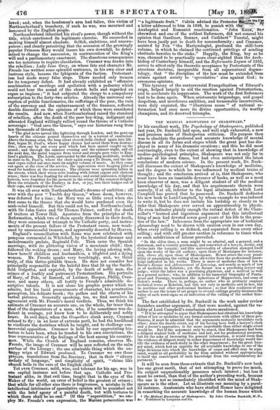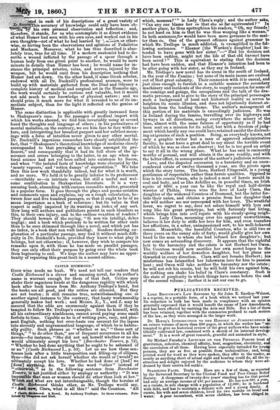THE MEDICAL KNOWLEDGE OF SHARSPEARE. * IN his excellent work, The
Psychology of Shakespeare, published last year, Dr. Bucknill laid open, and well nigh exhausted, a new and precious mine of Shaksperian criticism. His purpose then was to elucidate the profound and accurate knowledge of mental disease in all its forms and stages which the great poet has dis- played in many of his dramatic creations ; and this he did most convincingly, even to the extent of showing that in knowledge of medico-psychological principles, Shakspeare was not only far in advance of his own times, but had even anticipated the latest conclusions of modern science. In the present work, Dr. Buck- nill discusses the extent of Shakspeare's knowledge of medicine, and the degree to which he was influenced by medical trains of thought ; and the conclusion arrived at is, that Shakspeare, who must have been an insatiable devourer of books, as well as a most keen observer of men, was a diligent student of all the medical knowledge of his day, and that his acquirements therein were scarcely, if at all, inferior to the legal attainments which Lord Campbell has proved that he possessed. Dr. Bucknill dedicates his new book to Lord Campbell, by whose example he was induced to write it, but he does not imitate his lordship so closely as to infer that Shakspeare ever served an apprenticeship to physic. He even indicates plainly enough the radisal defect of the Chan- cellor's "learned and ingenious argument that this intellectual king of men had devoted seven good years of his life to the prac- tice of the law." Inferences from the appropriate use of technical phraseology need to be drawn with caution even in our own day, when every calling is so defined, and separated from every other calling; and with still greater caution in reference to times when no such subdivision of labour prevailed.
"In the olden time, a man might be an admiral, and a general, and.a statesman, and a country gentleman, and somewhat of a lawyer, doctor, and divine into the bargain ; and this universality of education stamped itself upon the works of the old authors ; upon those of Montaigne for instance, and, above all, upon those of Shakespeare. Hence arises the easy possi- bility of misjudging the calling of an old writer from the professional know- ledge indicated in his works. There is more of medicine than of law in Bacon's Essays and Adrancensent of _Learning, and nearly as much of law as of medicine in Rabelais; yet the former was a practising lawyer and judge ; while the latter was a practising physician, and a medical as well as a general author ; who in addition to his immortal biography of Pante-
gruel and Panurge, translated i ated the Aphorisms of Hippocrates, and some of Galen's works. There is, perhaps, no author who soprofusely employs technical terms as Rabelais, and this not only in medicine and in law, but in maritime and other professional business • so that this readiness of one author to use the terms of art proper to several callings greatly decreases the value of such word-signs as an indication of the calling of the author him- self."
The fact established by Dr. Bucknill in the work under review furnishes another argument, if that were needed, against the va- lidity of Lord Campbell's conclusion above mentioned..
"If it be attempted to argue that Shakespeare had obtained his knowledge either of law or medicine by any formal connexion with either of these pro- fessions, it must be admitted that the arguments mutually invalidate each other ; since the double event, say of his having been both a lawyer's clerk and a doctor's apprentice, is far more improbable than either single event would be. But if the argument only be urged, that Shakespeare had been a diligent student both of medicine and law, not for professional purposes, but for the sake of increasing his general information, it would seem that the evidence of diligent study in either department of knowledge would for- tify the evidence of such study in the other department ; for the great hun- gry mind, which had an appetite for all accessible knowledge in one of the large divisions into which the knowledge of cause and effect may be sepa- rated, would in all probability be far from satisfied without appropriating to itself the counterpart of such knowledge from the complementary de- partment."
It will be seen from these extracts that Dr. BucknilPs new book has one great merit, that of not attempting to prove too much. Its subject unquestionably possesses much interest ; but less it must be owned, than that of the author's preceding work, because the one is not so immediately identified with the mind of Shak- speare as is the other. Let us illustrate our, meaning by a paral- lel instance. Anatomists who have studied Homer have delighted in remarking the accurate knowledge of the human frame which • The Medical Knowledge of Shakespeare. By John Charles Buchan'. M.D., kc. Published by Longman and Co.
sted in each of his descriptions of a great variety of
Le Sate This accuracy of knowledge could only have been ob- e1.71ra' y his own personal observation and reflection; and, therefore, it stands, for us who contemplate it as direct evidence of what Homer had seen with his own eyes, and worked out in his own thoughts—not of what he had learned by or other- wise, as having been the observations and opinions of Podalirius and Machaon. Moreover, what he has thus described is abso- lutely true, true for all time. If a modern anatomist had to de- scribe a wound inflicted by the passage of a spear through a human body from one given point to another, he would be more minute in details than Homer has been ; he would name for in- stance the principal arteries, veins, and nerves, injured by the weapon, but he would omit from his description nothing that Homer had set down. On the other hand, if some Greek scholar, endowed with all Dr. BuolmilPs professional acumen, were to build up with materials gathered from the Riad and Odyssey a complete history of medical and surgical art in the Homeric age, the work would certainly be curious and valuable, but it would not add much to our knowledge of physical nature ; and we should prize it much more for what it revealed to us of its im- mediate subject, than for the light it reflected on the genius of Homer.
The same distinction is applicable with greatly increased force to Shakspeare's case. In the passages of medical import with which his works abound, we find him invariably using at second hand the thoughts and language of others ; in his portraitures of mental maladies, on the contrary, we see him face to face with na- ture, and interpreting her broadest purport and her subtlest mean- ings with a force of intuition never given to any other mortal. Dr. Bucknill's ingenious researches have clearly established the fact, that " Shakspeare's theoretical knowledge of medicine closely corresponded to that prevailing at his time amongst its pro- fessors," and consequently that it had its full share of the ig- norance and errors belonging to the latter, in an age when na- tural science had not yet been called into existence by Bacon, and when "the isolated facts of knowledge were obscured by the musty vapours,' and rotten damps' of superstition." We take then this new work thankfully indeed, but for what it is worth, and no more. We hold it to be greatly inferior to its predecessor --inevitably so—in intrinsic value, but still a useful and wel- come contribution to Shaksperian literature. It is a very amusing book, abounding with curious recondite matter, presented in a popular form. It goes through the plays and poems seriatim and comments upon and explains, say on a rough calculation, be- tween four and five hundred passages, so that it ought to be of no mean importance as a book of reference ; but its value in that respect is sadly impaired by its wanting an index of any sort. How long will authors and publishers persist in such blunders as this, to their own injury, and to the endless vexation of readers ? They should beware of the saying, "Si non vis intelligi, debes negligi; and a book which pretends to be written for other ends than to be once skimmed through like a novel, and which yet has no index, is a book that non vult intelligi. Readers desiring ex- planation of a particular passage, may find it without much diffi- culty in Dr. Bucknill's book, provided they know to what play it belongs, but not otherwise ; if, however, they wish to compare his remarks upon it, with those he has made on parallel passages, they can only effect their purpose by going over the whole book from beginning to end. We hope the author may have an oppor- tunity of repairing this great fault in a second edition.



























 Previous page
Previous page